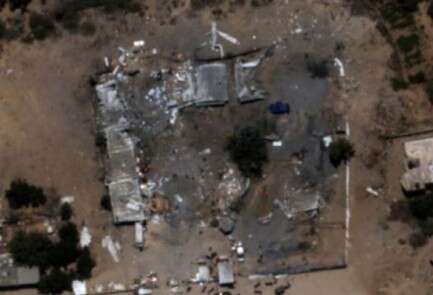A truce between Israel and Hamas, the Islamist terrorist group that controls the Gaza Strip, largely held on Saturday and Sunday in the wake of one of the fiercest flare-ups along the volatile border in years.
Shots were fired at IDF troops patrolling the border on Friday, as thousands of Palestinians rioted near the security fence. The troops returned fire and during the incident, a Hamas sniper killed Givati Brigade Staff Sgt. Aviv Levi, 21.
Shortly afterward, Gaza terrorists fired mortar shells at the Gaza-vicinity communities.
The IDF said three projectiles were fired at Israel. Two were intercepted by the Iron Dome defense system and the third hit an open area in Shaar Hanegev Regional Council.
The IDF mounted a harsh response, using air and ground forces to pummel Hamas positions in Gaza.
Arab media reported that Hamas leaders, including senior commanders in the Izzedine al-Qassam Brigades, the group's military wing, had gone underground for fear of Israeli retaliation.
According to the military, 60 terror hubs, including three Hamas battalion compounds and dozens of Hamas positions were destroyed.
"The targets included weapons manufacturing sites, a shaft to a network of tunnels, a factory used for manufacturing underground infrastructure, a drone warehouse, military command and control posts, training facilities and observation posts," the IDF said on its Twitter page.
Footage released by the military showed the extensive damage caused to Hamas' infrastructure.

Late Friday night Hamas had agreed to an Egyptian-brokered cease-fire with Israel.
A senior Israeli official confirmed a cease-fire was in place.
Hamas spokesman Fawzi Barhoum said the group accepted the truce and that calm had been restored.
Hamas official Taher Nono confirmed that Egyptian, Qatari and United Nations officials were involved in the efforts to restore calm and prevent an upsurge in violence on the Gaza border.
On Saturday, an IDF tank fired a warning shot at several Palestinians who tried to breach the border fence. No injuries were reported in the incident.
The Israeli communities near the border, which were placed on high alert on Friday, were allowed to resume their normal routine on Saturday, the IDF said.
A senior Israeli source told Israel Hayom that "Hamas sustained a massive blow and asked, via Egypt, to call a cease-fire. It pledged to stop arson terrorism and the terrorism on the border fence."
Other Israeli officials stressed that, contrary to media reports, the Egyptian-brokered truce, to which U.N. Middle East envoy Nickolay Mladenov was party, did not include any Israeli commitment to ease the Gaza blockade.
"If kite terrorism resumes, the IDF will resume its strikes on Hamas targets," a source in the Prime Minister's Office said Saturday. "Reality on the ground will determine where we go from here. If Hamas violates [the cease-fire] it will be made to pay."
Israeli officials said that Hamas reached out to Egypt for a cease-fire after the first Israeli airstrike on Friday, a move that reflects its weakness.
Israeli officials familiar with the issue said that the move indicates that Hamas is wary that Israel will make good on its warning to launch a wide-scale operation in Gaza.
Channel 10 News reported the cease-fire followed an Egyptian warning to the Palestinian terrorist group that a full-fledged Israeli incursion of Gaza was "mere hours away."
The report said Egypt also threatened to impose sanctions on Hamas if it did not end its cross-border arson campaign.
U.N. Secretary General António Guterres said Saturday he was "gravely concerned" about the escalation and called on both sides to step back from the prospect of another devastating conflict.
"Any further escalation will endanger the lives of Palestinians and Israelis alike, deepen the humanitarian catastrophe in Gaza and undermine current efforts to improve livelihoods.
"I call on Hamas and other Palestinian militants to cease the launching of rockets and incendiary kites and provocations" along the border fence with Israel from Gaza, Guterres said, adding that Israel "must exercise restraint to avoid further inflaming the situation."
He encouraged all parties to work with the U.N. to find a peaceful solution to the crisis.
Israel and Hamas have fought three wars over the past decade, in 2008, 2012 and 2014.
Israel has repeatedly said it has no interest in engaging in another war with Hamas but stressed it will no longer tolerate the group's border-riot and arson-terrorism campaigns.



